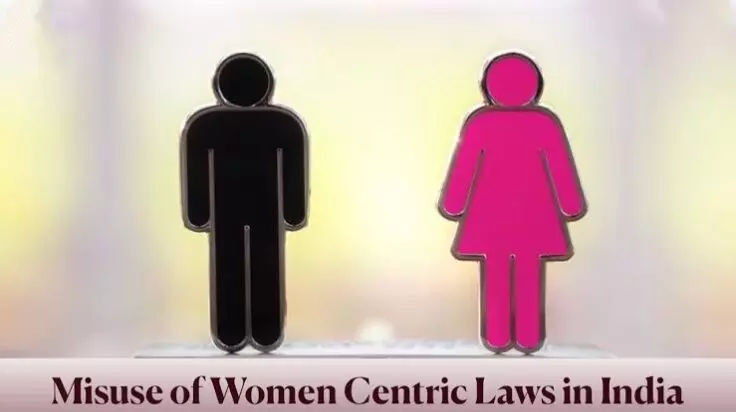When the Shield Becomes a Sword: A Retrospective on the Misuse of Women-Centric Laws in India

Two recent cases have reignited the debate over the misuse of women-centric laws in India, highlighting the devastating consequences of such alleged abuse.
Cafe Owner Case, the suicide of a 40-year-old cafe owner, allegedly driven by false accusations and harassment by his wife, sent shockwaves through the nation. His family has accused his wife of abetment, spotlighting the urgent need for reforms in legal safeguards for men.
Atul Subhash, A young tech professional’s tragic decision to end his life due to harassment from his spouse over false accusations added to the growing list of cases demanding attention to this issue. Atul’s story has become a rallying point for advocacy groups calling for gender-neutral laws.
These incidents underscore the human cost of the alleged misuse of protective laws, making it imperative to evaluate the historical and legal context.
The Genesis of Women-Centric Laws
The legislative efforts to address gender inequality began in earnest during the latter half of the 20th century. Key enactments such as the Dowry Prohibition Act, 1961, Section 498A of the IPC (introduced in 1983), and the Protection of Women from Domestic Violence Act, 2005 (DV Act) sought to shield women from harassment, cruelty, and violence. These laws were instrumental in acknowledging the systemic oppression of women and aimed at creating a safer environment within marriages and households.
The judiciary also played a proactive role, interpreting laws with an emphasis on women's rights. However, the pendulum that once swung in favor of protecting women has, over the decades, exposed its unintended consequence: the victimization of men through alleged misuse.
The Turning Tide: Allegations of Misuse
Over the years, reports of misuse of these laws have proliferated. Section 498A of the IPC, colloquially referred to as the "anti-dowry law," has faced particular scrutiny. Originally framed as a non-bailable, cognizable offense to address dowry harassment, it has been criticized for enabling the filing of frivolous or false complaints. The Supreme Court of India, in multiple judgments, has expressed concern over the misuse of Section 498A, calling it a “weapon” in the hands of some women to harass husbands and their families.
The DV Act, too, while empowering women to seek protection and remedies for domestic violence, has been criticized for being one-sided, allowing only women to file complaints. Men accused under such provisions often face social ostracization, loss of employment, and prolonged legal battles, irrespective of the veracity of the accusations.
Judicial Landmark Cases on Misuse of Women-Centric Laws
Bhajan Lal v. State of Haryana (1992): This case laid down guidelines for the police to prevent arbitrary arrests and harassment under various provisions, including Section 498A, by ensuring due diligence and preventing misuse of legal processes.
State of Bihar v. Arnesh Kumar (2014): The Supreme Court emphasized the need for police officers and magistrates to follow specific protocols before arresting or detaining individuals under Section 498A, significantly curbing its misuse.
Manav Adhikar v. Union of India Social Action Forum (2018): This judgment highlighted the importance of ensuring fairness and protecting the rights of all parties involved, stressing the need for checks and balances in cases filed under women-centric laws.
Union of India v. Independent Thought (2017): Although primarily focused on the rights of women and minors, this case serves as a reminder of the judiciary’s role in interpreting laws to uphold justice, irrespective of gender biases.
These judicial pronouncements reflect the judiciary's evolving understanding of the nuances and challenges posed by the misuse of such laws.
Impact on Men.
The ramifications of such alleged misuse are profound. Men accused under these laws often endure social stigma, psychological distress, and financial burdens due to prolonged legal battles. Families are dragged into prolonged legal battles, resulting in emotional trauma and financial ruin. The stigma associated with such accusations persists even after acquittal, leaving indelible scars.
Advocacy for Reform: The Push for Gender Neutrality
Men’s rights organizations and activists have been vocal in calling for gender-neutral laws. They argue for:
• Amendments to Section 498A: To introduce safeguards against misuse, including penalties for filing false complaints.
• Gender-Neutral Domestic Violence Laws: To ensure men can also seek protection and remedies for abuse.
• Streamlined Legal Processes: To prevent undue harassment during investigation and trial.
The judiciary has taken incremental steps, including mandating preliminary inquiries before arrest under Section 498A. However, activists argue that deeper legislative reforms are needed.
Lessons from the Past: Striking a Balance
The pendulum of justice has swung dramatically in the last 50-60 years. While the empowerment of women through progressive legislation has been a monumental achievement, the growing instances of misuse highlight the need for balance. Laws must serve their intended purpose without becoming instruments of oppression against another gender.
The Way Forward
The issue is not about rolling back protections for women but ensuring that legal safeguards are fair, equitable, and resistant to misuse. A collaborative approach involving lawmakers, judiciary, and civil society is essential to address the concerns of both genders. Only then can the legal framework truly uphold the principle of justice for all.
In this evolving narrative, the stories of men like Atul Subhash and countless others serve as somber reminders of the need for reform. Their voices, though silenced, echo the need for a balanced, empathetic approach to justice.
Suresh Tripathi, Advocate, www.sureshtripathi.com,
WhatsApp: 8104444526
